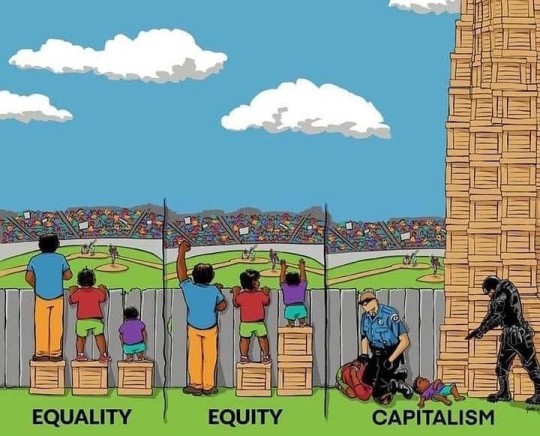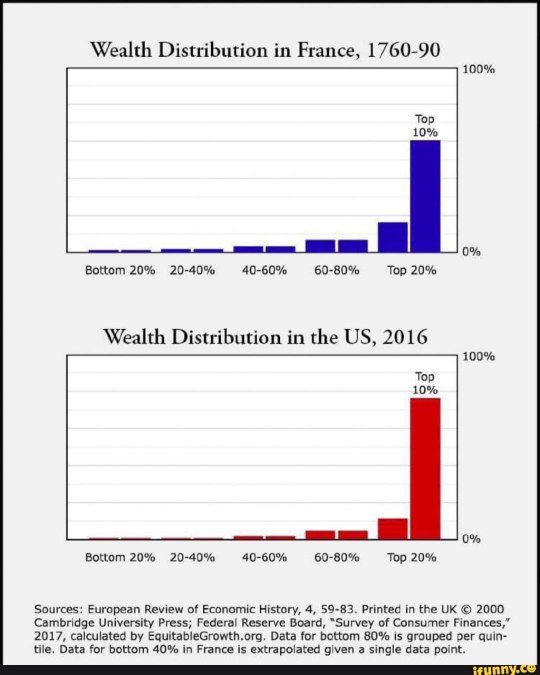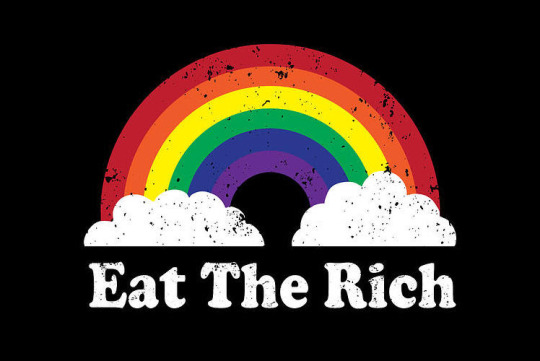#Wealth Distribution
Explore tagged Tumblr posts
Text

#politics#us politics#political#donald trump#news#president trump#elon musk#american politics#jd vance#law#bernie#bernie sanders#vermont#senator sanders#united states#us news#us#billionaire class#billionaire#billionaires#wealth inequity#wealth disparity#wealth distribution
5K notes
·
View notes
Text

Are they ripping the net open to share with their hungry kin? Or do they reel the net in, trapping all the fish for themselves?
"Wealth" 9"x12" Acrylic, spray paint, handmade paper fish, and plastic netting on canvas Available for collection
#wealth#money#wealth hoarding#wealth distribution#art#birds#fish#net#fishing#anthropomorphic#painting#acrylic#mixed media#traditional art#animal art
445 notes
·
View notes
Text

#equality#equity#capitalism#wealth inequality#one percent#economic justice#social inequality#economic exploitation#class divide#capitalism critique#systemic inequality#wealth hoarding#social justice#fairness#capitalism vs equality#equity vs equality#economic disparity#power imbalance#corporate greed#exploitation of labor#wealth concentration#capitalism failures#class oppression#socioeconomic inequality#rich vs poor#economic injustice#poverty trap#capitalism and inequality#wealth distribution
423 notes
·
View notes
Text
so ticked off when I hear "the youth is too leftist" or "young people are radicalized". bitch if we were, we'd be seizing the means of production. i personally think we aren't left and radical enough
#marxism#social issues#leftism#radicalize me daddy#young adult#gen z culture#zillenial#leftist#communism#Karl Marx#class issues#class war#classism#wealth distribution#wealth disparity#wage gap#economy#wage slavery#slave wages#minimum wage#class disparity#societal change#social change#societal issues#crapitalism#anti capitalism#end stage capitalism#dystopian#anticapitalista#late stage capitalism
98 notes
·
View notes
Text

Buffett has revised his plan to donate his fortune to the Gates Foundation in the future. Instead, he now plans to let his children decide.
#Warren Buffett#estate planning#philanthropy#Gates Foundation#charitable trust#inheritance#wealth distribution#Berkshire Hathaway#family#donations
63 notes
·
View notes
Text
wealth distribution in the us
i am making this post because my brother showed me a really good video that i think most people should watch. although this is not directly korea-related, in the words of bong-joon ho, “we all live under one country: capitalism.”
this video offers an insight on how unfair wealth distribution is under america, and it was created 12 years ago, meaning this unimaginably steep slope has increased. this may be about the us specifically, but most other countries in the world can see a similar slope because of unfair power distribution.

why does this impact korea?
korea, like a lot of other countries, suffered an unimaginable impact from the idea of the “american dream”. however, unlike countries like those in the balkans, for example, this wasn’t just an ideological spread, this was directly pushed on korea during it’s industrialisation because the industrialisation was funded and processed for the benefit of rich, powerful americans.
korea works the way it does under capitalism because that is what america funded it to be as opposed to it’s communist counterparts during the cold war and the korean war. though this is an assumption, i would assume there is a similar slope in korea, especially when considering chaebol families and how small differences in their society from western ones (like the importance of hierarchy) could emphasise this.
this is supported by some statistics i found, including the claim from the korea times that korea’s 10% holds 45% of income shares, a stark difference to its other asian and oceanic counterparts.

conclusion
if you’re interested in economy, sociology, or just the state of the world, this video is only 6 minutes, and it’s really easy to understand. i hope you enjoyed this little blog!
youtube
side note about future posts: i will probably be posting many squid game blogs nearing and following the release of season 3, but i will try to pepper in some more serious sociological analyses!
#korea#sociology#essay#capitalism#south korea#class#pink#wealth distribution#wealth inequality#america#usa#Youtube
8 notes
·
View notes
Text

What a cool and informative graphic that doesn't and shouldn't radicalize people whatsoever!
#What a cool and informative graphic that doesn't and shouldn't radicalize people whatsoever!#wealth distribution#france#usa#america#class war#ausgov#politas#auspol#tasgov#taspol#australia#fuck neoliberals#neoliberal capitalism#anthony albanese#albanese government
8 notes
·
View notes
Text
Balancing Wealth in Society: The Case for a Floor for the Poor and a Ceiling for the Rich
The idea that society should provide a "floor" for the poor and a "ceiling" for the rich stems from concerns around fairness, opportunity, and social stability. Here’s an outline of the reasoning:
1. Ensuring Basic Human Dignity and Opportunity for All (The Floor)
Basic Needs and Security: Establishing a minimum standard of living (e.g., housing, healthcare, education) ensures that everyone can live with dignity. It aims to prevent poverty from being a barrier to personal development and societal contribution.
Equal Opportunity: A social "floor" supports the idea that everyone should have a fair shot at success, regardless of birth circumstances. If people can access education, healthcare, and stable living conditions, they are better positioned to participate in society and the economy.
Economic Productivity: A healthier, better-educated population can contribute more effectively to the economy. Reducing extreme poverty is not only a moral issue but also an investment in human capital that benefits society as a whole.
2. Preventing Excessive Wealth Concentration (The Ceiling)
Power Imbalance and Democracy: When wealth accumulates excessively at the top, it often leads to disproportionate influence in politics, the economy, and media. A "ceiling" helps limit the risk of oligarchy, where a small elite may control policies in ways that benefit themselves over the broader population.
Resource Distribution and Social Cohesion: Concentrated wealth often translates into concentrated resources, such as land, labor, and technology, which can create economic inefficiencies and inequality. A ceiling helps redistribute resources to create a more balanced society, reducing tensions and potential social unrest.
Encouraging Social Responsibility: When wealth accumulation has an upper limit, it encourages the wealthy to focus on the broader impact of their success. This can promote reinvestment into society, philanthropy, and sustainable business practices rather than endless personal wealth expansion.
3. Reducing Economic Inefficiencies and Promoting Innovation
Promoting Circulation of Wealth: Wealth ceilings can lead to increased investment in public goods, infrastructure, and innovation. When excess wealth is capped, more resources may go into sectors that support public benefit rather than just individual enrichment.
Incentivizing Innovation Over Rent-Seeking: With a wealth ceiling, economic success would ideally shift focus from mere wealth accumulation to creative, impactful, and innovative contributions. This encourages businesses and individuals to prioritize improvements that benefit broader society.
A "floor" and "ceiling" model aims to strike a balance between ensuring that everyone has a fair chance to succeed and preventing the negative consequences of excessive wealth concentration. In this framework, everyone is better positioned to contribute meaningfully to society, fostering a more equitable, stable, and dynamic community.
#philosophy#epistemology#knowledge#learning#education#chatgpt#ethics#economics#sociology#Wealth Distribution#Social Equality#Economic Justice#Income Inequality#Poverty Alleviation#Basic Needs and Dignity#Wealth Ceiling#Economic Stability#Social Responsibility#Fair Opportunity
6 notes
·
View notes
Text

There's a lot of great "eat the rich" art out there. The problem is the rich aren't afraid. They know the odds against them becoming dinner are pretty long. Really, who would want to eat them?
Taxing them is another matter. In the 1950s, when the US economy was the best it's ever been, the top tax rate was 80%. It's time we got back to that.
Or... I'm a vegetarian, but I know how to butcher hogs.
#tax the rich#tax the billionaires#eat the rich#eat the fucking rich#kill the rich#billionaires should not exist#democrat#democratic socialism#vote blue#democracy#vote democrat#social democracy#democrats#vote biden#democrats now socialism later#vote blue to save democracy#wealth distribution#socialism
27 notes
·
View notes
Text
I will never get over the blatant and unapologetic predatory behavior towards poor people.
There's the study done back in the day on the cost of boots poor v. rich, but on a smaller, more recent note, most poor people have to use a laundromat and the cost to the person v. laundromat is absolutely insane.
A single load of laundry in our average washing machine takes about 5¢ to 25¢ per load of water and 15¢ to 30¢ per load of electricity (20¢ to 55¢ in total/load) so you'd think that the cost wouldn't be too high, even calculating in the wages of the one employee on staff and the small deductible for upkeep around the laundromat, especially with the number of people in the laundromat at any given time and considering people are usually doing multiple loads at a time.
The average cost of a single load in a washer is between $5 and $10, on average in a laundromat.
$5, I can give a pass to a point, but closer to $10 is the price I see most often (or even more) and the only thing I ever hear in response to this is "well, I guess you need to buy your own washer!"
I just... The quiet theft of everything we own, penny by penny, moment by moment, will never sit well with me.
2 notes
·
View notes
Text

Kash Patel, recently confirmed as the Director of the Federal Bureau of Investigation (FBI), brings a diverse background in law and national security to the role. His roles have provided him with extensive experience in overseeing national security operations and intelligence matters, aligning with the responsibilities of an FBI Director.
However, his confirmation was contentious, passing the Senate by a narrow 51-49 vote. Concerns were raised regarding his strong political affiliations and potential conflicts of interest, particularly related to his financial ties to the fashion brand Shein.  
Despite these controversies, Patel’s supporters argue that his legal and national security background equips him to lead the FBI effectively.
When the China-founded fashion company Shein goes public as soon as this year, it will mint billionaires and millionaires out of those fortunate enough to get shares early in the trendy retailer. Among the winners will be Kash Patel.
His mandatory financial disclosures revealed that he consulted for Elite Depot for nine months last year and earned between $1 million and $5 million worth of shares. These shares will become available to Patel when they vest throughout 2025. It was also reported that Patel introduced Shein executives to figures in the Trump orbit.
Financial compensation experts say Patel will be allowed to keep the shares even as he is confirmed as FBI director.
#FBI#fast fashion#shein#economics#politics#us politics#political#donald trump#news#president trump#elon musk#american politics#jd vance#law#kash patel#us news#conflict of interest#trump#president donald trump#government#us government#late stage capitalism#capitalism#capital gains#greed#wealth inequity#wealth disparity#wealth distribution#maga#republican
45 notes
·
View notes
Text

#wow#Jesus#and#elon musk#Tesla#pathetic loser#loser#incel culture#right wing idiot#wealth#billionaire#billions#Elon#history#wealth disparity#wealth distribution#peasants and gods at this point#we are plebs#plebeians#peasants#we the people#are fucking toast#humanity#human history#money#Luigi#luigi mangione#anti oligarchy#oligarchy
4 notes
·
View notes
Text


#homelessness#social mobility#wealth gap#media manipulation#millionaire#economic disparity#income inequality#class consciousness#working class#brainwashing#class status#social inequality#wealth distribution#billionaire#social stratification#economic mobility
164 notes
·
View notes
Text
One million seconds is approximately 11 days, one billion seconds is approximately 31 years 🗣️📣
#tax the rich#tax the fucking rich#tax the billionaires#tax the wealthy#tax the churches#fuck musk#trump administration#us politics#random facts#food for thought#something to chew on#something to think about#wealth disparity#wealth distribution#classism#class war#eat the rich#current events#revolution
6 notes
·
View notes
Text
An open letter to the U.S. Congress
Support S. 3402 / HR 6608, The End Hedge Fund Control of American Homes Act.
123 so far! Help us get to 250 signers!
The housing crisis is devastating communities all across the country, and corporate executives are exploiting it to put more money in their pockets. We shouldn’t allow private equity firms to buy up vast quantities of American homes and create a generation of lifelong renters. Congress needs to act fast and help promote access to safe, affordable housing and homeownership for American families, not Wall Street.
That’s why I support S. 3402 / HR 6608, The End Hedge Fund Control of American Homes Act. This legislation seeks to put an end to the harmful practice of hedge funds buying up single-family homes by banning hedge funds from owning these types of homes and requiring them to sell at least 10% of the total number of single-family homes they currently own to families per year over a 10-year period. After a 10-year full phase-out, all hedge funds will be completely banned from owning any single-family homes. This legislation will bring down housing prices, giving more families the opportunity to purchase a home and set their families up for a bright future.
I’d like you to co-sponsor and work to pass this vital legislation. Continued Congressional inaction on the housing crisis is unacceptable. Thanks.
▶ Created on October 30 by Jess Craven · 122 signers in the past 7 days
📱 Text SIGN PQLBVB to 50409
🤯 Liked it? Text FOLLOW JESSCRAVEN101 to 50409
#JESSCRAVEN101#PQLBVB#airbnb#affordable housing#housing crisis#housing affordability#Airbnb impact#hedge fund ownership#housing justice#corporate landlords#homeownership rights#End Hedge Fund Control Act#S. 3402#HR 6608#rental housing crisis#housing market reform#Wall Street landlords#lifelong renters#housing inequality#real estate investment#housing access#affordable homeownership#economic justice#wealth distribution#single-family homes#ban hedge fund landlords#housing stability#protect renters#housing advocacy#petition Congress
3 notes
·
View notes
Text
If America's wealth was evenly distributed, each person would have $471,465
#usa#america#usa is a terrorist state#usa is funding genocide#wealth disparity#wealth distribution#class war#eat the rich#eat the fucking rich#eat the 1%#human rights#maths#ausgov#politas#auspol#tasgov#taspol#australia#fuck neoliberals#neoliberal capitalism#anthony albanese#albanese government
3 notes
·
View notes